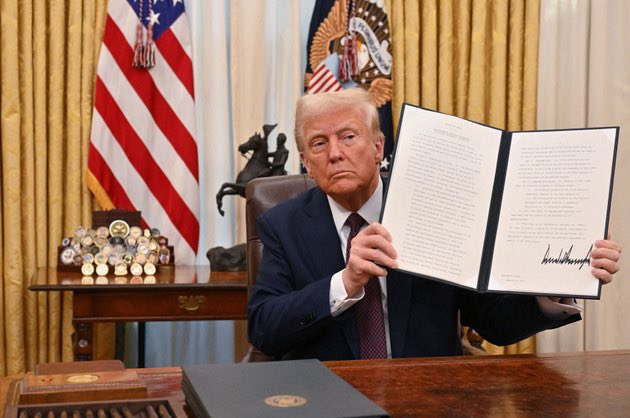Trump Clarifies Electronics Tariffs Amid Global Trade Tensions.
US President Donald Trump has confirmed that Chinese-made smartphones, computers, and other electronics will not be exempt from tariffs, clarifying that these products are simply being moved into a different category of levies, rather than escaping duties altogether.
His comments followed widespread confusion after a US customs notice issued on Saturday suggested certain electronics would be excluded from the 125% tariff imposed on goods from China. The update had sparked optimism in global markets, leading to a bounce in European stock exchanges on Monday morning.
However, President Trump took to social media to refute claims of exemptions, stating: “There is no exemption for smartphones or computers – they are just moving to a different Tariff ‘bucket’.” He added that more information would be provided in a forthcoming update, focusing on semiconductors and the entire electronics supply chain as part of the administration’s National Security Tariff Investigations.
US Commerce Secretary Howard Lutnick explained on Sunday that these electronics will now be subject to a new “semiconductor tariff”, in addition to the global tariffs previously announced – which had been paused temporarily for 90 days. “We need our medicines, and we need semiconductors and our electronics to be built in America,” Lutnick said.
Semiconductors are crucial components of modern technology, powering smartphones, laptops, and a wide range of electronic devices. Trump’s emphasis on domestic production is seen as part of a broader effort to bring manufacturing back to the US and reduce reliance on foreign supply chains.
China, in response, urged the US to “completely cancel” the tariffs and return to a path of “mutual respect”. The Chinese commerce ministry described the exemptions rumoured over the weekend as a “small step” and said it was assessing the impact of the move.
Trade tensions between the world’s two largest economies have continued to escalate since early April, when the US first imposed a 54% tariff on Chinese imports. This has since risen to a staggering 145%. In retaliation, China has raised its tariffs from an initial 34% to 125%, effective from last Saturday.
The White House has yet to confirm any plans for a direct dialogue between Trump and Chinese President Xi Jinping. US Trade Representative Jamieson Greer stated on Sunday that “right now, we don’t have any plans on that,” during an interview on CBS’s *Face the Nation*.
Meanwhile, global companies are already feeling the effects. Sony announced a 10% price increase for its flagship PlayStation 5 console across Europe, Australia, and New Zealand, citing inflation, exchange rate volatility, and broader economic pressures. Notably, no price adjustments have been announced in the US market.
As the tariff saga unfolds, businesses and consumers alike await further clarification from the White House on how the latest changes will impact pricing, supply chains, and international trade relations in the months ahead.



